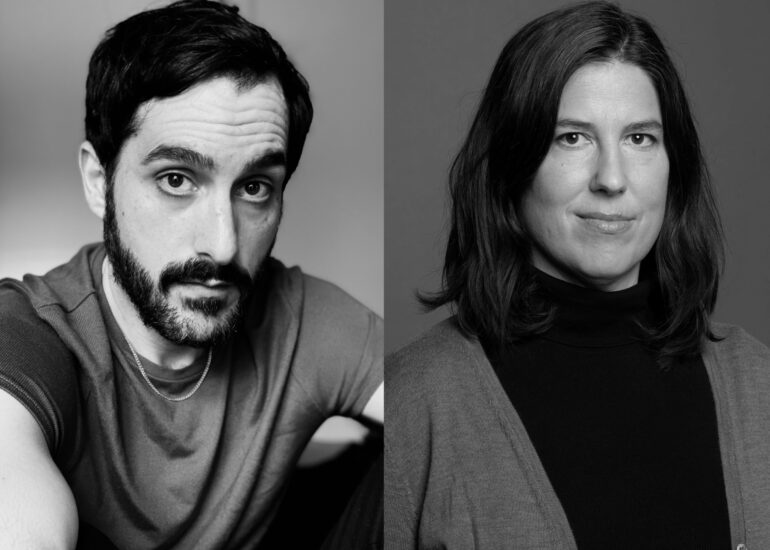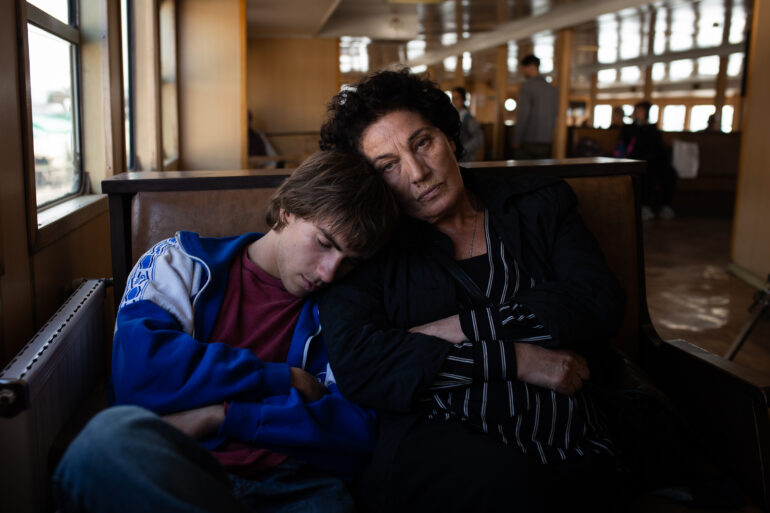WRITTEN BY: Marta Balaga
In Crossing, director/writer Levan Akin heads to Turkey, pushing boundaries of Nordic cinema even further.
In Levan Akin’s Crossing (Passage), Swedish nominee for the Nordic Council Film Prize 2024, retired teacher Lia (Mzia Arabuli) leaves her Georgian home and heads to Turkey. She is looking for her trans niece, Tekla, who disappeared without a trace. Soon, alongside her young neighbour Achi (Lucas Kankava), Lia is discovering Istanbul’s hidden corners. And some of its residents who – just like Tekla – fled their families, because they refused to recognise them for who they really were.
Produced by Mathilde Dedye for French Quarter Film, Crossing opened Berlinale’s Panorama section in February. It also received the TEDDY Jury Award. Akin’s previous film And Then We Danced drew universal acclaim – and controversy in Georgia, where it’s set. Recently, he has been working on the series Interview with the Vampire, created by Rolin Jones.
When you decide to set a story in a place that’s perhaps not that familiar to you, like Istanbul, is it a struggle at first?
Mathilde Dedye: The whole core of Crossing and also of And Then We Danced was to show these places to the so-called Western audience. We wanted to show a completely different environment and a country that, at least to me, felt so far away. That’s how our own journey with Levan started as well. He was questioning what he wanted to do as a director. With And Then We Danced, it was an important subject. It felt personal, and it reflected his Georgian origins.
Did you work process start in a documentary-like way?
Levan Akin: Yes, it was all very research-based. I have been working in TV and film in Sweden for many years before that film, and I felt I wasn’t given a chance to really explore filmmaking. I was trying to fit in, to please others – also as a Swede with a different background. When I look back, it makes me a little sad.
I realised there was no point in trying to make things just to feel accepted within this space. I was going to make something that felt meaningful – to me. Now, I know I can make a film in Georgia or Turkey, like with Crossing. It wasn’t as maligned as And Then We Danced was in Georgia, but at a recent local festival, only the cis people from the film were invited, even though trans actors lived nearby. There are things in this business that are not nice to discover, and there are many fair-weather friends. If supporting something politically looks good, they will. But they don’t actually care.
I appreciate that these two films are quite spectacular. Very often arthouse filmmakers might assume they have to limit themselves because of money.
Levan Akin: We are fighting a climate in Sweden that’s not so open to us; Swedish filmmakers with other backgrounds. Things are changing. When we did And Then We Danced, we had to fight for every penny. And I have done things in Sweden before! Mathilde was like: “Come on! We are experienced, we have been working for 15 years.” We heard: “Yes, but this film isn’t relevant, and nobody is going to care.”
What I am trying to say is this: Nobody knows anything. But we definitely had very little support. That’s why it makes me happy when you say these films still feel ambitious. I love cinema, and I think I’m able to craft things that feel less “modest”. With Crossing, I wanted to go even further.
Do you think the old-fashioned concepts of what constitutes a Nordic film are still in place? Do you hear: “How come this is a Swedish nominee”?
Levan Akin: When I did press for Crossing, every journalist in Sweden asked me: “When are you going to make a Swedish film?” I made a Swedish film! I am Swedish, but suddenly I wasn’t: They would describe me as “Georgian-Swedish”, or even just Georgian. Even some colleagues would publicly question it. That’s how far the discourse has shifted to the right. It was certainly an eye-opener, and not in a good way.
Mathilde Dedye: You always think about the economic aspect of it – the money is scarce, so people say: “You don’t belong here.” In the documentary field, being “international” was always viewed as a good thing. When it comes to features, I think Tarik Saleh’s The Nile Hilton Incident started that conversation locally. For us, it was a major event.
I am also bicultural, French and Swedish, and it’s certainly not by accident that we ended up working together with Levan. In Sweden, 30% of the population has this multicultural background. It’s important to show these perspectives. But when there’s no money, people claim they know who deserves it and who doesn’t.
Levan Akin: Crossing has done well all over the world. After And Then We Danced, Mathilde and I suddenly found ourselves in a situation where we were “international” filmmakers. The question is: Do people in Sweden value that?
Mathilde Dedye: Sometimes it feels like they don’t. You can reach a big number of people – the kind of number you wouldn’t with a “local” film – but the domestic audience doesn’t care. I think you could compare what we are doing to what Tarik Saleh is doing. We are tackling global questions, because it’s a new era, and these are new kinds of films. We don’t think we are making “Nordic” arthouse. Levan used to go to an international school, in Sweden, and he has Georgian roots. That’s why his films are this way, full of colour and energy.
Levan Akin: This grandeur you mentioned before, Marta, might also have something to do with it. Even though I really think these films are intrinsically Swedish, because they talk about equality and solidarity, things Sweden used to be known for. Even though the country has now veered away from it.
They are not relentlessly grim, despite the seriousness of the situations. You find a way to introduce joy in Crossing.
Levan Akin: These are precarious times. Frankly, I have been quite depressed for the last seven years. My films are a way of reminding myself that people have this capacity for kindness. They want to help each other if they can. They struggle, yes, but that’s not all they do. When I talk about traumatic experiences with my cousins or my sister, we start laughing. You go to a funeral, and someone says something funny about the deceased: That’s life. It comes naturally to me.
It does, but was it harder to find humour this time around? Crossing is not a romantic love story like And Then We Danced, and some relationships shown here are not that obvious.
Levan Akin: We had an earlier draft of the script that everyone loved, and it was much more tragic. But I didn’t want to do it that way. If it’s about queer people, some people automatically assume something bad has to happen to them.
When I was doing my research for the film, that’s what I saw: energy and resilience. This attitude of we-are-not-going-to-take-any-shit. You don’t want to be too saccharine, of course, so hopefully you can end up in a place that’s bittersweet. A lot of it had to do with the casting, too. We cast people who have humour and light in their eyes. Even the cops are likeable – they just want to eat their fucking lunch. I really think life is kind of funny. People are funny. Don’t you think?
Official trailer:
The film will be screened at NCFP events in Stockholm and Reykjavík. To read more about Crossing: CLICK HERE.
The Nordic Council Film Prize was first awarded in 2002 and then permanently established in 2005, and is to be juxtaposed with the Nordic Council Literature Prize, the Children & Young People's Literature Prize, the Music Prize, and the Environment Prize. The winner of the prizes will be announced October 22 via RÚV.

